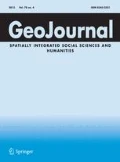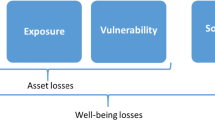Abstract
This paper examines the early social consequences of the largest oil spill in Korea from December 2007 up to May 2008. The focus is on the social impact of the oil spill and its social implications in three major areas of oil spill response: (1) clean-up operations, (2) compensation, and (3) ecological impact. The paper highlights both the positive and negative consequences of the spill and the significance of the early social assessment to understand subsequent responses and adaptation in the long run.






Similar content being viewed by others
References
Arata, C., Picou, J., Johnson, D., & McNally, S. (2000). Coping with technological disaster: An application of the conservation of resources model to the Exxon Vadez oil spill. Journal of Traumatic Stress, 12(1), 23–39.
Badri, S. A., Asgary, A., & Eftekhari, A. R. (2006). Post-disaster resettlement, development and change: A case study of the 1990 Manjil earthquake in Iran. Disasters, 30(4), 451–468.
Baldwin, M., Davis, E., & Witham, B. (2000). Recent development: A review of developments in ocean and coastal law 1999–2000. Ocean & Coastal Law Journal, 5(2), 367–368.
Beamish, T. (2002). Silent spill: The organization of an industrial crisis. Cambridge, Massachusetts: MIT Press.
Becker, H. A., & Vanclay, F. (2006). The international handbook of social impact assessment: Conceptual and methodological advances. Cheltenham: Elgar.
Birkland, T. A., & Lawrence, R. G. (1993). Economic-impact of an environmental accident—A time series analysis of the Exxon Valdez oil-spill in south-central Alaska. Sociological Spectrum, 13(1), 35–63.
Bruhn, J. (2005). The sociology of community connections. Boston: Birkhäuser.
Cheong, S. (2004). Managing fishing at the local level: the role of fishing village cooperatives in Korea. Coastal Management, 32(2), 191–202.
Cheong, S. (2005). Korean fishing communities in transition: Limitations of community-based resource management. Environment and Planning A, 37(7), 1277–1290.
Cheong, S. (2010). Initial responses to the MT Hebei-Spirit oil spill. Marine Technology Society Journal, 44(1), 69–74.
Davis, N. Y. (2000). The Exxon valdez oil spill Alaska. United Nations University.
Denison, M. (2000). Does the Oil Pollution Act of 1990 rise to the level of a taking? How the court missed the boat in Maritrans, Inc. v. United States. Ocean & Coastal Law Journal, 5(2), 355–367.
Dyer, C. L. (1992). Social disruption and the valdez oil-spill-Alaskan natives in a natural-resource community. Sociological Spectrum, 12(2), 105–126.
Dyer, C. L. (1993). Tradition loss as secondary disaster–long-term cultural impacts of the Exxon valdez oil-spill. Sociological Spectrum, 13(1), 65–88.
Edelstein, M. (1988). Contaminated Communities: The social and psychological impacts of residential toxic exposure. Boulder, CO: Westview Press.
Faure, M., & Hu, J. (2006). Prevention and compensation of marine pollution damage: Recent developments in Europe, China and the US. Netherlands: Kluwer Law International.
Garcia, I. P. (2004). Nunca Mais! How current European environmental liability and compensation regimes are addressing the prestige oil spill of 2002. University of Pennsylvania Journal of International Economic Law, 1395, 1417–1425.
García Pérez, J. D. (2003). Early socio-political and environmental consequences of the Prestige oil spill in Galicia. Disasters, 27(3), 207–223.
KORDI. (2008). Hebei-Spirit Oil Spill CleanUp, White Paper prepared by the Korea Ocean & Research Development Institute (KORDI). December 2008. Minstry of Land, Transport, and Maritime Affairs, Coast Guard, Choongnam Province.
KORDI. (2009). Report on the Hebei-Spirit Oil Spill. Ch. 5 Socio-economic conditions. Paper prepared by the Korea Ocean & Research Development Institute (KORDI). Ministry of Land, Transport, and Maritime Affairs (MLTM).
Martin, G. (1999). Valdez spill leaves bitter residue: Oil is gone after 10 years, but ecological, economic fallout continues. SFGate, San Francisco Chronicle (March 24, 1999). http://www.sfgate.com/cgibin/article.cgi?file=/chronicle/archive/1999/03/24/MN63912.DTL Accessed 03 July 2010.
MLTM. (2008a). Evaluation of marine pollution management: The case of Hebei-spirit oil spill. May 2008. Ministry of Land, Transport, and Maritime Affairs (MLTM).
MLTM. (2008b). Mid-term report on marine oil pollution after the Hebei-Spirit Oil Spill. October, 2008. Ministry of Land, Transport, and Maritime Affairs (MLTM).
Olshansky, R., Johnson, L., & Horne, J. (2008). Longer view: Planning for the rebuilding of New Orleans. Journal of the American Planning Association, 74(3), 273–287.
Ott, R. (2008). Not one drop: Betrayal and courage in the wake of the exxon valdez oil spill, Chelsea Green Publishing.
Palinkas, L. A., Downs, M. A., Petterson, J. S., & Russell, J. (1993). Social, Cultural, and Psychological Impacts of the Exxon Valdez Oil Spill. Human Organization, 52(1), 1–12.
Picou, J. S., & Gill, D. A. (1998). Technological disaster and chronic community stress. Society and Natural Resources, 11, 795–815.
Picou, J., Marshall, B., & Gill, D. (2004). Disaster, litigation, and the corrosive community. Social Forces, 82(4), 1426–1497.
Rajkumar, A. P., Premkumar, T. S., & Tharyan, P. (2008). Coping with the Asian tsunami: Perspectives from Tamil Nadu, India on the determinants of resilience in the face of adversity. Social Science and Medicine, 67(5), 844–853.
Sabucedo, J. M., Constsantino, A., Ferraces, M. J., Merino, H., & Duran, M. (2009). Psychological impact of the prestige catastrophe. International Journal of Clinical and Health Psychology, 9(1), 105–116.
Sutton, P. (2007). The Environment: a sociological introduction Polity: 73–80.
Taean Annual Statistics. (2005). Taean County, Korea.
Taean Annual Statistics. (2006). Taean County, Korea.
Taean Annual Statistics. (2007). Taean County, Korea.
Taean Annual Statistics. (2008). Taean County, Korea.
Webler, T., & Lord, F. (2010). Planning for the human dimensions of oil spills and spill response. Environmental Management, 45, 723–738.
Author information
Authors and Affiliations
Corresponding author
Rights and permissions
About this article
Cite this article
Cheong, SM. A social assessment of the Hebei-Spirit oil spill. GeoJournal 76, 539–549 (2011). https://doi.org/10.1007/s10708-010-9368-4
Published:
Issue Date:
DOI: https://doi.org/10.1007/s10708-010-9368-4




